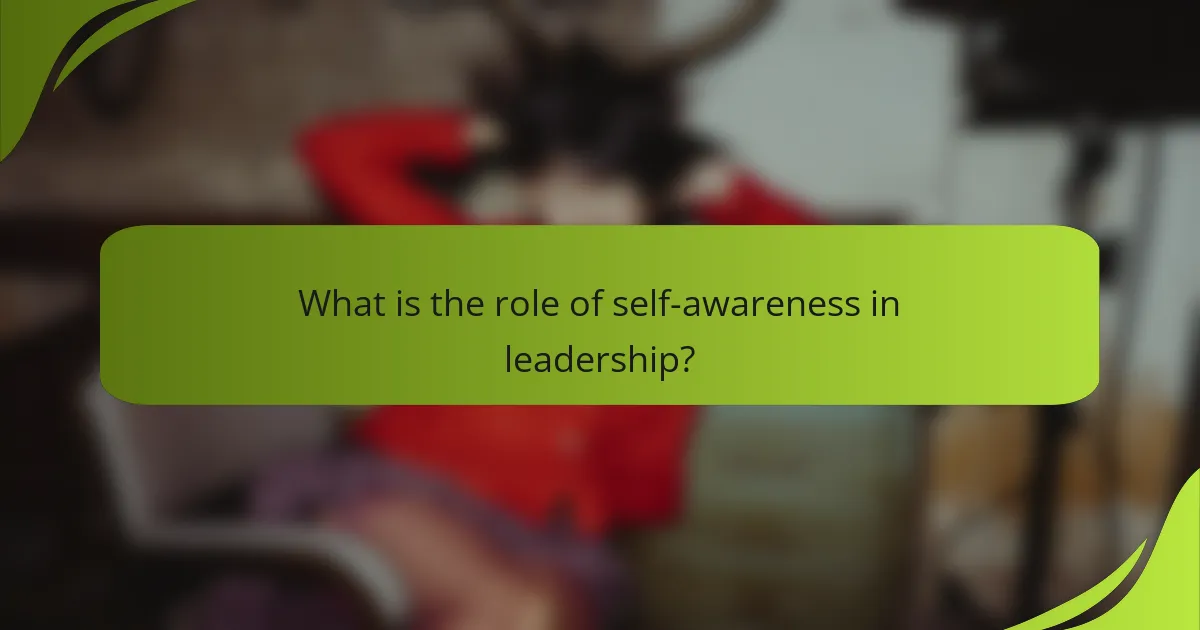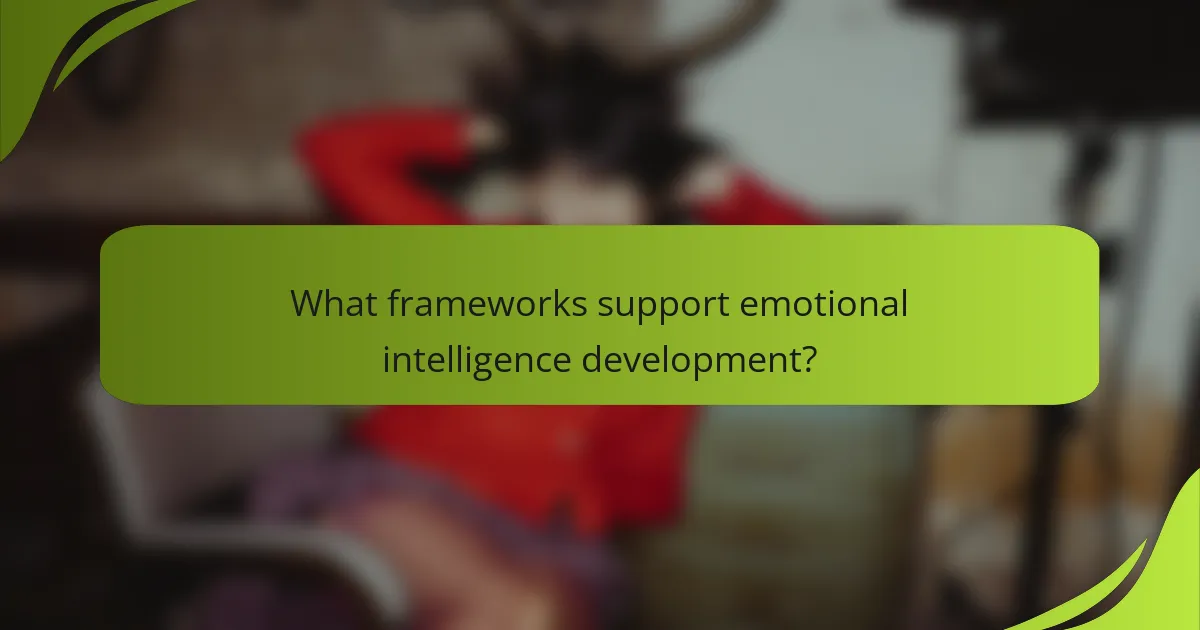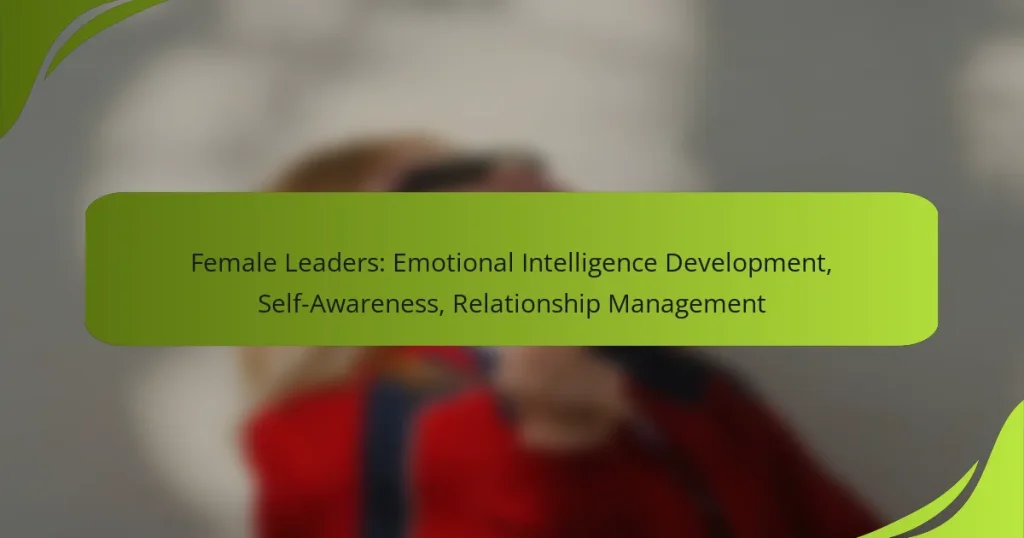Female leaders can significantly enhance their leadership capabilities by developing emotional intelligence, which encompasses self-awareness, relationship management, and emotional regulation. By participating in structured programs, they can improve their understanding of their emotions and strengths, leading to more effective navigation of challenges and fostering positive work environments. Additionally, honing skills in communication and conflict resolution is vital for building trust and collaboration within their teams.

How can female leaders develop emotional intelligence?
Female leaders can develop emotional intelligence through various structured approaches that enhance self-awareness, relationship management, and emotional regulation. Engaging in targeted programs and activities can significantly improve their ability to connect with others and lead effectively.
Workshops on emotional intelligence
Workshops focused on emotional intelligence provide hands-on experiences that help participants understand and apply key concepts. These sessions often include interactive activities, role-playing, and group discussions that foster a deeper understanding of emotional dynamics in leadership.
When selecting workshops, look for those that offer practical tools and frameworks, such as the Emotional Intelligence Framework by Daniel Goleman. Consider attending workshops that are recognized within your industry for maximum relevance.
Mentorship programs
Mentorship programs pair emerging female leaders with experienced mentors who can provide guidance on emotional intelligence development. These relationships can help mentees gain insights into managing emotions and building strong interpersonal connections.
To maximize the benefits, choose mentors who have demonstrated high emotional intelligence in their careers. Regular meetings and open discussions about challenges can enhance the learning experience and foster personal growth.
Online courses for emotional intelligence
Online courses offer flexible learning options for female leaders to enhance their emotional intelligence at their own pace. Many platforms provide comprehensive modules covering self-awareness, empathy, and relationship management tailored for leadership contexts.
Look for courses that include assessments and practical exercises, allowing for real-world application of the concepts learned. Platforms like Coursera and LinkedIn Learning often feature courses from reputable institutions, making them a good choice.
Coaching sessions with experts
Coaching sessions with emotional intelligence experts can provide personalized feedback and strategies for improvement. These sessions typically involve one-on-one interactions where leaders can explore their emotional responses and develop tailored action plans.
When seeking a coach, consider their credentials and experience in emotional intelligence training. Regular sessions can lead to significant improvements in self-awareness and relationship management skills, which are crucial for effective leadership.

What is the role of self-awareness in leadership?
Self-awareness is crucial in leadership as it allows individuals to understand their emotions, strengths, and weaknesses, which directly influences their effectiveness. Leaders who are self-aware can better navigate challenges and foster a positive work environment.
Enhances decision-making
Self-awareness improves decision-making by enabling leaders to recognize their biases and emotional triggers. When leaders understand their thought processes, they can make more rational choices, leading to better outcomes for their teams.
For example, a self-aware leader might realize they tend to rush decisions under stress. By acknowledging this tendency, they can implement strategies to pause and reflect, ensuring more thoughtful and balanced decisions.
Improves interpersonal relationships
Leaders with high self-awareness are better equipped to manage their relationships with team members. They can empathize with others’ perspectives, which fosters trust and collaboration.
For instance, a leader who recognizes their communication style may adjust it to be more inclusive, encouraging open dialogue and reducing misunderstandings. This adaptability strengthens team dynamics and enhances overall morale.
Boosts confidence in leadership
Self-awareness contributes to a leader’s confidence by providing a clear understanding of their capabilities and areas for growth. This clarity allows leaders to present themselves authentically, which can inspire confidence in their teams.
A confident leader is more likely to take calculated risks and advocate for their ideas, knowing they have a solid grasp of their strengths. This self-assuredness can galvanize a team, motivating them to pursue ambitious goals together.

How can female leaders improve relationship management?
Female leaders can enhance relationship management by focusing on effective communication, conflict resolution, and trust-building within their teams. These skills are essential for fostering a collaborative environment and promoting strong interpersonal connections.
Effective communication techniques
Effective communication is crucial for relationship management. Female leaders should practice active listening, ensuring they fully understand team members’ perspectives before responding. This approach helps to create an open dialogue and encourages team members to share their thoughts freely.
Utilizing clear and concise language is also important. Avoid jargon and be straightforward to minimize misunderstandings. Regular check-ins and feedback sessions can further enhance communication, allowing leaders to gauge team morale and address concerns promptly.
Conflict resolution strategies
Conflict is inevitable in any team, but female leaders can manage it effectively by addressing issues early. Encouraging open discussions about disagreements helps to clarify misunderstandings and fosters a culture of transparency. It’s essential to remain neutral and facilitate conversations rather than taking sides.
Implementing a structured approach to conflict resolution can be beneficial. Techniques such as identifying the root cause, brainstorming solutions collaboratively, and agreeing on actionable steps can lead to constructive outcomes. Leaders should also model calmness and respect during conflicts to set a positive example.
Building trust in teams
Building trust is foundational for strong relationships within teams. Female leaders can cultivate trust by being consistent in their actions and decisions, demonstrating reliability. Sharing personal experiences and vulnerabilities can also help to humanize leadership and encourage team members to open up.
Recognizing and celebrating team achievements fosters a sense of belonging and loyalty. Regularly expressing appreciation for individual contributions can significantly enhance trust levels. Leaders should also be approachable, creating an environment where team members feel comfortable discussing challenges and seeking support.

What frameworks support emotional intelligence development?
Several frameworks provide structured approaches to developing emotional intelligence, which is crucial for effective leadership. These models offer insights into understanding emotions, enhancing self-awareness, and improving relationship management skills.
Goleman’s Emotional Intelligence Model
Daniel Goleman’s Emotional Intelligence Model identifies five key components: self-awareness, self-regulation, motivation, empathy, and social skills. Each component plays a vital role in how individuals manage their emotions and interact with others.
To develop these skills, leaders can engage in reflective practices, such as journaling or mindfulness meditation, which enhance self-awareness and self-regulation. For example, regularly assessing one’s emotional responses in various situations can lead to better emotional control and improved interpersonal relationships.
Bar-On Model of Emotional-Social Intelligence
The Bar-On Model emphasizes the interplay between emotional and social competencies, categorizing them into five areas: intrapersonal skills, interpersonal skills, stress management, adaptability, and general mood. This holistic approach recognizes that emotional intelligence is not just about individual emotions but also about how one interacts with others.
Leaders can use this model to assess their emotional-social intelligence through self-report questionnaires or 360-degree feedback from peers. By identifying areas for improvement, leaders can focus on specific skills, such as enhancing adaptability in stressful situations or fostering better interpersonal relationships.

What are the benefits of emotional intelligence for female leaders?
Emotional intelligence (EI) offers significant advantages for female leaders, enhancing their ability to navigate complex interpersonal dynamics and drive team success. By developing EI, female leaders can improve their self-awareness, relationship management, and overall effectiveness in leadership roles.
Increased team performance
Female leaders with high emotional intelligence can foster a collaborative environment that boosts team performance. By understanding team members’ emotions and motivations, they can tailor their leadership style to meet diverse needs, leading to improved productivity and creativity.
For example, leaders who actively listen and respond to feedback can identify strengths and weaknesses within their teams, allowing for targeted development and enhanced performance. This approach often results in teams that are more cohesive and focused on shared goals.
Enhanced employee engagement
Emotional intelligence plays a crucial role in enhancing employee engagement. Female leaders who demonstrate empathy and emotional awareness create a supportive atmosphere where employees feel valued and understood. This connection leads to higher job satisfaction and loyalty.
To maximize engagement, leaders should regularly check in with their teams, encourage open communication, and recognize individual contributions. Simple gestures, such as acknowledging achievements or providing constructive feedback, can significantly impact morale and motivation.
Better organizational culture
A strong emotional intelligence framework contributes to a healthier organizational culture. Female leaders who prioritize EI can cultivate an environment of trust, respect, and inclusivity, which is essential for fostering collaboration and innovation.
To build a positive culture, leaders should model emotional intelligence behaviors, such as conflict resolution and active listening. Encouraging team-building activities and promoting diversity can further enhance the organizational climate, leading to a more engaged and productive workforce.

How does emotional intelligence impact workplace diversity?
Emotional intelligence (EI) significantly enhances workplace diversity by fostering understanding and collaboration among diverse teams. Leaders with high EI can navigate complex interpersonal dynamics, ensuring that all voices are heard and valued, which ultimately leads to a more inclusive work environment.
Fosters inclusive environments
Emotional intelligence fosters inclusive environments by promoting empathy and active listening. Leaders who are attuned to the emotions of their team members can create spaces where individuals feel safe to express their ideas and concerns. This openness encourages participation from employees of various backgrounds, enhancing diversity.
To cultivate an inclusive atmosphere, leaders should practice self-awareness and recognize their biases. Regularly seeking feedback from team members can help identify areas for improvement and reinforce a culture of respect and acceptance. Simple actions, like acknowledging contributions from quieter team members, can make a significant difference.
Additionally, training programs focused on developing emotional intelligence can be beneficial. Organizations might consider workshops that teach skills such as conflict resolution and effective communication, which are essential for managing diverse teams. Investing in such training can lead to improved team cohesion and overall performance.


